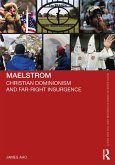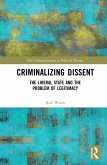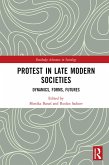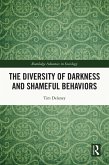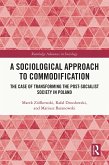Nativist and Islamist Radicalism (eBook, PDF)
Anger and Anxiety
Redaktion: Kaya, Ayhan; Koca, Metin; Benevento, Aysenur
0,00 €
0,00 €
inkl. MwSt.
Sofort per Download lieferbar

0 °P sammeln
0,00 €
Als Download kaufen

0,00 €
inkl. MwSt.
Sofort per Download lieferbar

0 °P sammeln
Jetzt verschenken
Alle Infos zum eBook verschenken
0,00 €
inkl. MwSt.
Sofort per Download lieferbar
Alle Infos zum eBook verschenken

0 °P sammeln
Nativist and Islamist Radicalism (eBook, PDF)
Anger and Anxiety
Redaktion: Kaya, Ayhan; Koca, Metin; Benevento, Aysenur
- Format: PDF
- Merkliste
- Auf die Merkliste
- Bewerten Bewerten
- Teilen
- Produkt teilen
- Produkterinnerung
- Produkterinnerung

Bitte loggen Sie sich zunächst in Ihr Kundenkonto ein oder registrieren Sie sich bei
bücher.de, um das eBook-Abo tolino select nutzen zu können.
Hier können Sie sich einloggen
Hier können Sie sich einloggen
Sie sind bereits eingeloggt. Klicken Sie auf 2. tolino select Abo, um fortzufahren.

Bitte loggen Sie sich zunächst in Ihr Kundenkonto ein oder registrieren Sie sich bei bücher.de, um das eBook-Abo tolino select nutzen zu können.
This book analyses the factors and processes behind radicalization of both native and self-identified Muslim youths.
- Geräte: PC
- ohne Kopierschutz
- eBook Hilfe
- Größe: 4.5MB
Andere Kunden interessierten sich auch für
![Nativist and Islamist Radicalism (eBook, ePUB) Nativist and Islamist Radicalism (eBook, ePUB)]() Nativist and Islamist Radicalism (eBook, ePUB)0,00 €
Nativist and Islamist Radicalism (eBook, ePUB)0,00 €![Maelstrom (eBook, PDF) Maelstrom (eBook, PDF)]() James AhoMaelstrom (eBook, PDF)40,95 €
James AhoMaelstrom (eBook, PDF)40,95 €![Navigating Colour-Blind Societies (eBook, PDF) Navigating Colour-Blind Societies (eBook, PDF)]() Amani HassaniNavigating Colour-Blind Societies (eBook, PDF)42,95 €
Amani HassaniNavigating Colour-Blind Societies (eBook, PDF)42,95 €![Criminalizing Dissent (eBook, PDF) Criminalizing Dissent (eBook, PDF)]() Rob WattsCriminalizing Dissent (eBook, PDF)45,95 €
Rob WattsCriminalizing Dissent (eBook, PDF)45,95 €![Protest in Late Modern Societies (eBook, PDF) Protest in Late Modern Societies (eBook, PDF)]() Protest in Late Modern Societies (eBook, PDF)42,95 €
Protest in Late Modern Societies (eBook, PDF)42,95 €![The Diversity of Darkness and Shameful Behaviors (eBook, PDF) The Diversity of Darkness and Shameful Behaviors (eBook, PDF)]() Tim DelaneyThe Diversity of Darkness and Shameful Behaviors (eBook, PDF)44,95 €
Tim DelaneyThe Diversity of Darkness and Shameful Behaviors (eBook, PDF)44,95 €![A Sociological Approach to Commodification (eBook, PDF) A Sociological Approach to Commodification (eBook, PDF)]() Marek ZiólkowskiA Sociological Approach to Commodification (eBook, PDF)42,95 €
Marek ZiólkowskiA Sociological Approach to Commodification (eBook, PDF)42,95 €-
-
-
This book analyses the factors and processes behind radicalization of both native and self-identified Muslim youths.
Dieser Download kann aus rechtlichen Gründen nur mit Rechnungsadresse in A, B, BG, CY, CZ, D, DK, EW, E, FIN, F, GR, HR, H, IRL, I, LT, L, LR, M, NL, PL, P, R, S, SLO, SK ausgeliefert werden.
Produktdetails
- Produktdetails
- Verlag: Taylor & Francis eBooks
- Seitenzahl: 262
- Erscheinungstermin: 10. April 2023
- Englisch
- ISBN-13: 9781000888744
- Artikelnr.: 67700520
- Verlag: Taylor & Francis eBooks
- Seitenzahl: 262
- Erscheinungstermin: 10. April 2023
- Englisch
- ISBN-13: 9781000888744
- Artikelnr.: 67700520
- Herstellerkennzeichnung Die Herstellerinformationen sind derzeit nicht verfügbar.
Ayhan Kaya is Professor of Politics and Jean Monnet Chair of European Politics of Interculturalism in the Department of International Relations, Istanbul Bilgi University, Turkey. Ay¿enur Benevento works as a postdoctoral researcher in the European Research Council advanced grant project, PRIME Youth, conducted at Istanbul Bilgi University, Turkey. Metin Koca works as a postdoctoral researcher in the European Research Council advanced grant project, PRIME Youth, conducted at Istanbul Bilgi University, Turkey.
Introduction
Part I: Spatial Deprivation and Local Contexts
1. Please, Don't Blame Us: It Is Possible to Be Both Muslim and a Good
Citizen in a Catholic Country
2. Alternative für Deutschland's Appeal to Native Youth in Dresden:
Heritage Populism
3. The Interplay of Psychological Stress, Aggression, Identity, and
Implicit Knowledge: Findings from a Qualitative Study of Disengagement and
Deradicalisation Processes involving Former Right-Wing Extremists
Part II: Mental Processes of Radicalisation
4. Islamophobia and Radicalisation: When Attitudes of Both Mainstream
Society and Immigrant-Origin Muslims Become Extreme
5. Radicalisation, Extremism, or A Third Position?: How French Muslim Women
Engage with the Challenges of Assimilation and Difference
6. Is It Radical for a Woman to Become a Stay-at-Home Mother or Wear a
Headscarf?
Part III: Critical Analyses of Islamist Radicalisation
7. Risking Muslims: Counter-Radicalisation Policies and Responses of Dutch
Muslims to the Racialization of Danger
8. The Radicalisation of Moroccan-Origin Youth in Europe: The Case of
France
9. Religiosities in a Globalised Market: Migrant-Origin Muslim Europeans'
Self-Positioning Beyond the Sending and Receiving States' Politics of
Religion
10. Commentary: Why Extremism?
Epilogue
Part I: Spatial Deprivation and Local Contexts
1. Please, Don't Blame Us: It Is Possible to Be Both Muslim and a Good
Citizen in a Catholic Country
2. Alternative für Deutschland's Appeal to Native Youth in Dresden:
Heritage Populism
3. The Interplay of Psychological Stress, Aggression, Identity, and
Implicit Knowledge: Findings from a Qualitative Study of Disengagement and
Deradicalisation Processes involving Former Right-Wing Extremists
Part II: Mental Processes of Radicalisation
4. Islamophobia and Radicalisation: When Attitudes of Both Mainstream
Society and Immigrant-Origin Muslims Become Extreme
5. Radicalisation, Extremism, or A Third Position?: How French Muslim Women
Engage with the Challenges of Assimilation and Difference
6. Is It Radical for a Woman to Become a Stay-at-Home Mother or Wear a
Headscarf?
Part III: Critical Analyses of Islamist Radicalisation
7. Risking Muslims: Counter-Radicalisation Policies and Responses of Dutch
Muslims to the Racialization of Danger
8. The Radicalisation of Moroccan-Origin Youth in Europe: The Case of
France
9. Religiosities in a Globalised Market: Migrant-Origin Muslim Europeans'
Self-Positioning Beyond the Sending and Receiving States' Politics of
Religion
10. Commentary: Why Extremism?
Epilogue
Introduction
Part I: Spatial Deprivation and Local Contexts
1. Please, Don't Blame Us: It Is Possible to Be Both Muslim and a Good
Citizen in a Catholic Country
2. Alternative für Deutschland's Appeal to Native Youth in Dresden:
Heritage Populism
3. The Interplay of Psychological Stress, Aggression, Identity, and
Implicit Knowledge: Findings from a Qualitative Study of Disengagement and
Deradicalisation Processes involving Former Right-Wing Extremists
Part II: Mental Processes of Radicalisation
4. Islamophobia and Radicalisation: When Attitudes of Both Mainstream
Society and Immigrant-Origin Muslims Become Extreme
5. Radicalisation, Extremism, or A Third Position?: How French Muslim Women
Engage with the Challenges of Assimilation and Difference
6. Is It Radical for a Woman to Become a Stay-at-Home Mother or Wear a
Headscarf?
Part III: Critical Analyses of Islamist Radicalisation
7. Risking Muslims: Counter-Radicalisation Policies and Responses of Dutch
Muslims to the Racialization of Danger
8. The Radicalisation of Moroccan-Origin Youth in Europe: The Case of
France
9. Religiosities in a Globalised Market: Migrant-Origin Muslim Europeans'
Self-Positioning Beyond the Sending and Receiving States' Politics of
Religion
10. Commentary: Why Extremism?
Epilogue
Part I: Spatial Deprivation and Local Contexts
1. Please, Don't Blame Us: It Is Possible to Be Both Muslim and a Good
Citizen in a Catholic Country
2. Alternative für Deutschland's Appeal to Native Youth in Dresden:
Heritage Populism
3. The Interplay of Psychological Stress, Aggression, Identity, and
Implicit Knowledge: Findings from a Qualitative Study of Disengagement and
Deradicalisation Processes involving Former Right-Wing Extremists
Part II: Mental Processes of Radicalisation
4. Islamophobia and Radicalisation: When Attitudes of Both Mainstream
Society and Immigrant-Origin Muslims Become Extreme
5. Radicalisation, Extremism, or A Third Position?: How French Muslim Women
Engage with the Challenges of Assimilation and Difference
6. Is It Radical for a Woman to Become a Stay-at-Home Mother or Wear a
Headscarf?
Part III: Critical Analyses of Islamist Radicalisation
7. Risking Muslims: Counter-Radicalisation Policies and Responses of Dutch
Muslims to the Racialization of Danger
8. The Radicalisation of Moroccan-Origin Youth in Europe: The Case of
France
9. Religiosities in a Globalised Market: Migrant-Origin Muslim Europeans'
Self-Positioning Beyond the Sending and Receiving States' Politics of
Religion
10. Commentary: Why Extremism?
Epilogue


